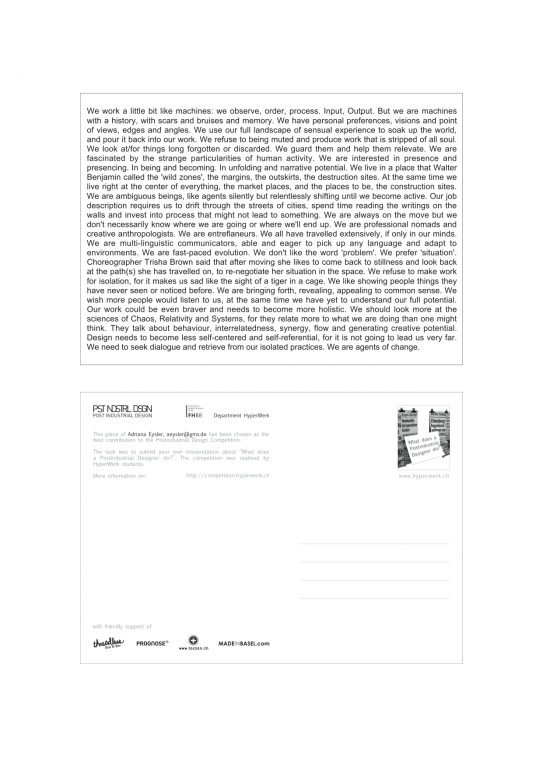Lab:
The Lab is a source of information for Artists and Art Lovers alike. You can find useful information to help develop your career as an artist such as tutorials, interviews, news, and a lot more!
What does a post-industrial designer do?
In 2006, Adriana Eysler, a designer trained at Goldsmiths College and London College of Communication, took part in a competition organised by the Applied Science Department of the University of Basel, Switzerland. Participants had to answer the question: “What does a post-industrial designer do?
Here is part of her answer:
“We work a little bit like machines: we observe, order, process. Input, Output. But we are machines with a history, with scars and bruises and memory. We have personal preferences, visions and point of views, edges and angles. We use our full landscape of sensual experience to soak up the world, and pour it back into our work. We refuse to being muted and produce
work that is stripped of all soul. We look at/for things long forgotten or discarded. We guard them and help them relevate. We are fascinated by the strange particularities of human activity. We are interested in presence and presencing. In being and becoming. In unfolding and narrative potential. We live in a place that Walter Benjamin called the 'wild zones', the margins, the outskirts, the destruction sites. At the same time we live right at the center of everything, the market places, and the places to be, the construction sites.
We are ambiguous beings, like agents silently but relentlessly shifting until we become active. Our job description requires us to drift through the streets of cities, spend time reading the writings on the walls and invest into process that might not lead to something. We are always on the move but we don't necessarily know where we are going or where we'll end up. We are professional nomads and creative anthropologists. We are entreflaneurs. We all have travelled extensively, if only in our minds. We are multi-linguistic communicators, able and eager to pick up any language and adapt to environments. We are fast-paced evolution. We don't like the word 'problem'. We prefer 'situation'. […] We need to seek dialogue and retrieve from our isolated practices. We are agents of change.”
Adriana was awarded first prize for this answer.
And you, what do you think? ¿What does an Artist do today?



